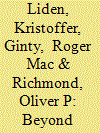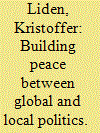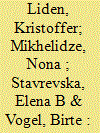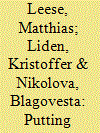|
|
|
Sort Order |
|
|
|
Items / Page
|
|
|
|
|
|
|
| Srl | Item |
| 1 |
ID:
091969


|
|
|
|
|
| Publication |
2009.
|
| Summary/Abstract |
Reflecting the Western-led, international political climate after the Cold War, the various peace operations of the last two decades have sought to build sustainable forms of peace through political, social and economic liberalization. As postulated by liberal constitutionalism and internationalism, these efforts are expected to contribute to international as well as domestic peace by adding the liberalized state to a pacific union of liberal democracies. Their aim is to reproduce the (neo)liberal (meaning a market democracy) sovereign state and a liberal normative and institutional system of government and international governance.
|
|
|
|
|
|
|
|
|
|
|
|
|
|
|
|
| 2 |
ID:
091971


|
|
|
|
|
| Publication |
2009.
|
| Summary/Abstract |
What are the ethical implications of the shortcomings of liberal peacebuilding operations? This article addresses the problem by investigating the normative premises of liberal peacebuilding and its critics. Three ideal types of peacebuilding are singled out to illuminate the normative logic of current 'revisionist' proposals. These are: 're-liberal peacebuilding' which prescribes a more coercive approach; 'social peacebuilding' that emphasizes local agency and the promotion of socioeconomic rights; and 'multicultural peacebuilding' that roots peace in indigenous norms and institutions. These alternatives are assessed with regard to their ability to promote both the autonomy and the basic needs of the affected population. It is concluded that only 'social peacebuilding' passes this test. It exemplifies a model of global governance where a cosmopolitan human rights agenda is consistent with the communitarian defence of political autonomy and cultural diversity.
|
|
|
|
|
|
|
|
|
|
|
|
|
|
|
|
| 3 |
ID:
143797


|
|
|
|
|
| Summary/Abstract |
From a peacebuilding perspective, EU support for civil society organizations (CSOs) in conflict-ridden countries can be criticized for artificially boosting a liberal, ‘bourgeois’ civil society at the expense of more representative initiatives at the grassroots level. Seen from a governance perspective, however, this criticism is lacking in nuance and conceals the actual rationale and effects of the support. To advance a realistic debate on international peacebuilding as a form of governance, this article investigates what the character and effects of EU support for CSOs in conflict-ridden countries actually are: how does it affect the relations between the supported organizations and (1) the wider society, (2) the state and (3) between the recipient country and the EU? We consider four ideal types of EU conflict governance: ‘liberal peace’, ‘hollow hegemony’, ‘vibrant hegemony’ and ‘post-liberal peace’ and compare them to empirical data from Bosnia and Herzegovina, Cyprus and Georgia. We find that while the objectives of promoting peace and democracy through CSO support tend to fail, the strategic interests of the EU are still maintained.
|
|
|
|
|
|
|
|
|
|
|
|
|
|
|
|
| 4 |
ID:
164286


|
|
|
|
|
| Summary/Abstract |
In this article, we examine the possibility of exercising critique through the mandatory ethical coverage that EU security research projects must be subjected to. Applied ethics, so we argue, speaks to several core issues in the critical security studies agenda, such as turning abstract considerations of critique into forms of tangible cooperation, engaging exoteric communities, and placing normative questions about security within concrete contexts of its imagination and production. Accordingly, it can be seen as a concrete way of putting critique to work. At the same time, however, applied ethics does face considerable challenges that result from its location in the middle of numerous cross-pressures, such as political ambitions, economic interests, technological rationales and the demands of security professionals. These challenges risk turning what was intended to be the critical corrective of applied ethics into a legitimizing function of mere ‘ethics approval’. Drawing on personal experiences as well as debates on critical security studies and ethics, we discuss some of these challenges and discuss the possibility of and conditions for critique within the arena of EU security research.
|
|
|
|
|
|
|
|
|
|
|
|
|
|
|
|
|
|
|
|
|